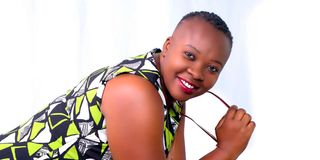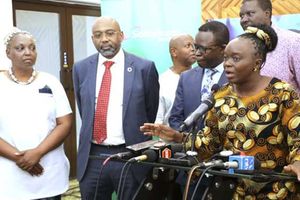So, you want to try self-publishing?

What you need to know:
- With my first book, I didn’t know much about marketing. I depended on my colleagues and friends to buy the book and recommend it to other people.
- I sold just a few copies and remained with dozens of books. I had to strategise and acquire marketing skills.
- Now, thanks to social media, my market is growing.
Anyango Aketch, 40, is a teacher, poet and an author of seven books. She is currently pursuing a PhD degree in Literature at Mount Kenya University. She shares the joys and pains of being a self-publisher.
When did you write your first book?
I was 33 years old when I published my first book called The Mirror. Growing up, I was very passionate about writing, and while in secondary school, I would often look at text books and secretly admire the authors.
You have seven titles under your belt, what are the books about?
I write about general life encounters, highlighting themes such as pain, pleasure, fantasy, dreams deferred, love and happiness. I write to release my emotions and to connect with readers.
My target audience is young adults because this is a group that is transitioning and yearning to know more about life. Also, this is the period of my life that I write most about because it is when I got a better understanding of different aspects of life.
How did your childhood shape you into the writer you are today?
As a child, I struggled with protein intolerance. There are days I could not go to school because of painful blisters all over my body. Books borrowed from friends and school library became my escape. I believe this birthed my interest in books. I am a multi-tasking bibliophile – I read multiple books of different genres at a time.
A great lesson that I have learned is that you cannot be a good writer if you don’t read extensively. Five of my titles are poetry books. I have also written a novella called Beautiful Mathilda which is about high school struggles like peer pressure, drug abuse and teen pregnancy. The Haunted Flute is a memoir about my intimate relationships.
You’re a teacher, mother, poet and student. When do you get time to write?
I walk around with my diary. When an idea comes to me during the day, I pen it in my dairy and get back to it at night, when my family is asleep. When I encounter writer’s block, I take a break from the project and recharge by listening to music or taking a walk.
Has writing made you a better teacher?
Oh yes. I am a teacher of English in Kakamega County teaching learners of different levels, some full time and others, part time. Writing has made me a better storyteller and it helps me engage with my students in different conversations. That way, the sessions are more engaging. Some of my students aspire to be writers like me.
As a self-published author, what would you want readers to know?
There are many steps in self-publishing that include writing, editing, and cover design, pre-production, printing and marketing. At the onset, I faced many challenges. The editing was not properly done and there were issues with the cover and size of the book. As a self-publisher, you have to own the process, from the start to the end.
The other obstacle that comes with self-publishing is marketing. It is possible to write a great book and end up with hundreds of copies you can’t sell. With my first book, I didn’t know much about marketing. I depended on my colleagues and friends to buy the book and recommend it to other people. I sold just a few copies and remained with dozens of books. I had to strategise and acquire marketing skills. Now, thanks to social media, my market is growing.
The good thing about self-publishing is that you decide the cost of your books and take home the profits earned. Also, you determine when you want the books to come out.
What are some of the unethical practices in the publishing industry?
Fake reviews, dishonest publishers and intellectual thieves who might disappear with your manuscript.
What is the best money you ever spent as a writer?
A few years ago, I sold copies of one of my books and earned Sh50,000. I used part of the money to celebrate the achievement. I tell upcoming writers that this is an unpredictable field. One time you are selling hundreds of copies and another time you are selling just one book or two. You have to be patient and aggressive in marketing.
What one thing would you give up to become a better writer?
If circumstances allowed, I would stop teaching and fully focus on writing. However, that would still be a great risk and compromise because I enjoy teaching.
What is your message to a young person aspiring to write and publish a book?
Keep writing. There are days when what you are writing won’t make sense but keep at it. Two factors for success in this profession is effort and consistency.





